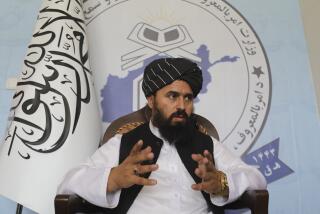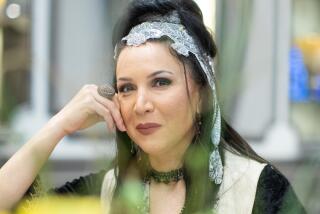A Quiet General Fights for Her Nation
- Share via
KABUL, Afghanistan — Her voice is barely a whisper and she glides about with the grace of a swan, but there is little else soft or feminine about Suhaila Seddiqi.
The only female general in the Afghan army, the 62-year-old military surgeon who will become health minister Saturday has strayed about as far from tradition as Islam and her countrymen allow.
Having outlasted the fanatic Taliban regime, Seddiqi--or “the General,” as she is known to most Afghans--is approaching her new life in government with quiet confidence and steely determination.
“I wouldn’t be taking this job if there wasn’t a genuine desire for change,” Seddiqi said in a rare interview since accepting her appointment to the country’s 30-seat interim Cabinet. “And I would not have been chosen for this post if women were only being included as some kind of show.”
As head of the 400-bed military hospital here in the capital--before and after the Taliban demoted her to the running of the women’s section--Seddiqi has shown she can deftly handle what most here would consider a man’s job. She has spent her entire career in the army, rising through the medical corps ranks in 38 years of service.
“We are already recovering from this terrible time when half of our country’s resources were wasted,” she said, referring to the five-year reign of the Taliban, which forbade education for females and fired most from the workplace. “The medical school has resumed teaching young women, and they will again show themselves to be the best students, as they did during my time. Women learn more easily because they are smarter and pay more attention.”
Eschewing the head-to-toe burka worn by most Afghan women, Seddiqi disparaged the garment as a denigration of the individual.
“Already, more women are showing their faces in public. Many have become used to the burka and are still afraid to go out without it. But this is a matter of habit, and it cannot survive,” said the bespectacled general, whose own uniform is an ankle-length black chiffon dress and a black swept-back veil.
Never politically active, Seddiqi believes she was asked to join the Cabinet precisely because she is untainted by association with any failed regimes of the past.
“I never left my country through all these hardships, and I have never belonged to any party or movement,” she said, recalling that she learned of her unsolicited appointment while listening to the news from this month’s Afghan talks in Germany on the BBC.
Some might have found the appointment without consultation presumptuous. But Seddiqi said the negotiators in Bonn knew her by reputation and were correct in assuming that she would be eager to take on the task of repairing a health-care system ravaged by war, disease, poverty and a three-decade exodus of trained medical personnel.
“Health care in this country is a shambles,” she said. “We need to make the best use of the aid that is coming in now to create even the minimal conditions for treating the sick and injured.”
With the austere poise and serenity of a nun, Seddiqi exudes a no-nonsense attitude, traveling about the capital in a battered army-green Volga sedan with no personal staff except a driver. She has also challenged the custom of recent years to segregate medical treatment: female doctors for female patients, male doctors for male patients.
“The Koran says that a sick person should be helped. It doesn’t say anything about separating the genders. And we can ill afford to make such distinctions when we have so few medical resources at our disposal,” she said, vowing a more rational provision of health care than was practiced under the Taliban.
Insistent that recovery depends as much on Afghans’ patriotism as on peace and donations, Seddiqi said her colleagues in exile are honor-bound to return to their homeland.
“Every Afghan living abroad must come back to do his or her part in rehabilitating the country. There is no excuse for staying away now that there is peace,” she said of the doctors, nurses and technicians who fled.
Under the interim leadership of Prime Minister-designate Hamid Karzai, Seddiqi will be joined by Sima Samar, deputy prime minister and minister for women’s and children’s affairs, in the Cabinet that will serve as both executive and legislature until a longer-term provisional government can be seated after a spring convocation of tribal elders.
Seddiqi, who never married or had children, accepts with profound responsibility her de facto position as a role model for a new generation of Afghan women who will now have better opportunities for education and employment.
“Women don’t want to stay home. It’s very dull having a life without any independence,” she said, expressing no regrets about choosing a career over family life at a time when few women realized they had that option.
A graduate of Kabul University’s medical school, Seddiqi trained in internal medicine in Moscow in the 1960s, enjoying the good fortune of studying during academic heydays.
Her command of the Russian language stood her in good stead during the 1979-89 Soviet occupation, and her commitment to quality medical care in the chaotic years after Moscow’s withdrawal earned her respect among the moujahedeen who ruled until the 1996 Taliban takeover.
Under President Burhanuddin Rabbani in the early 1990s, she was named chief of the military hospital and elevated to the rank of general, the only Afghan woman to attain that rank in modern times.
Seddiqi, a member of Afghanistan’s dominant Pushtun tribe, is respected among colleagues as a capable, indefatigable administrator.
“She will have real power. She would not allow herself to be used as a token,” former fellow military surgeon Abdul Haq said of Seddiqi’s future as a government minister.
Asked if he would like to see his own daughters, ages 12 and 13, follow in Seddiqi’s unconventional footsteps, Haq didn’t hesitate in his reply.
“She is a good model for young women to follow, and I would be pleased if my daughters decided to become doctors,” said Haq, who now makes his living as an ambulance physician. “Suhaila is intelligent, hard-working and skilled. Our country needs more women like that.”
More to Read
Sign up for Essential California
The most important California stories and recommendations in your inbox every morning.
You may occasionally receive promotional content from the Los Angeles Times.














